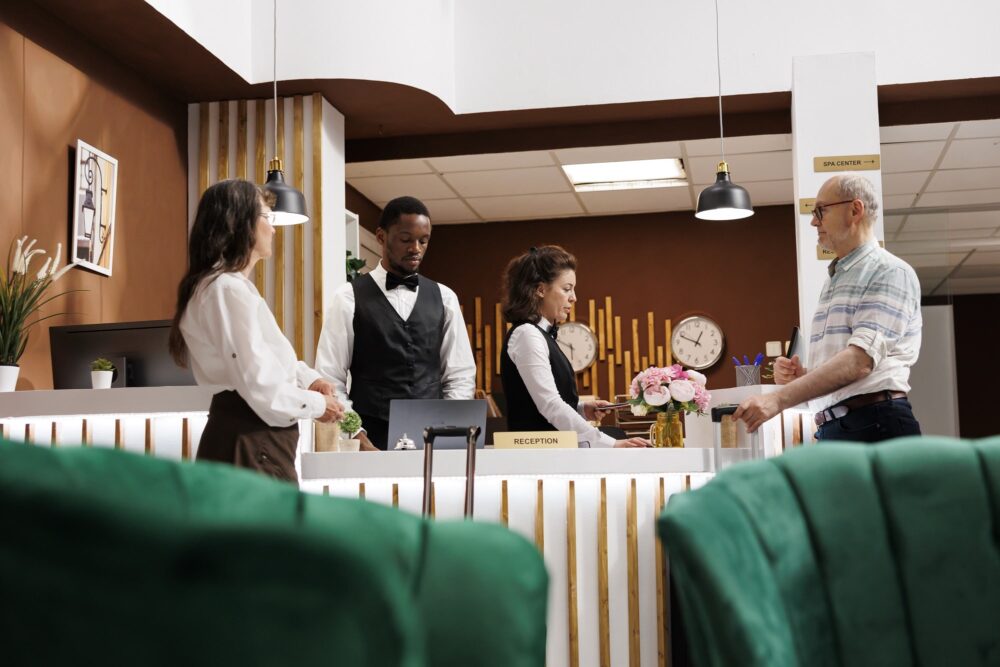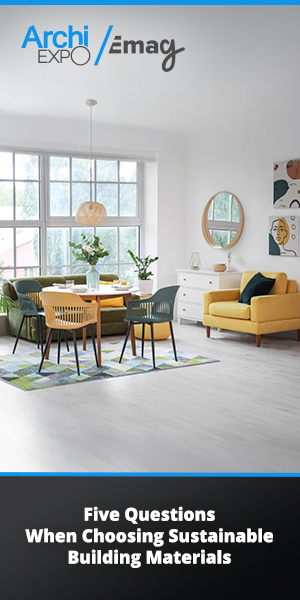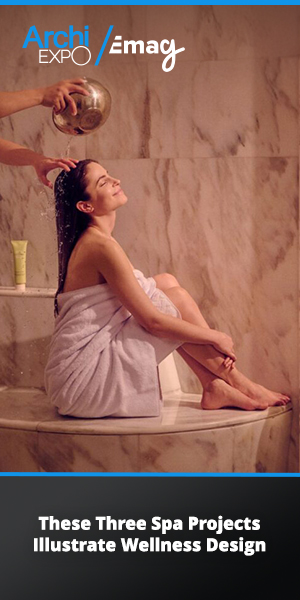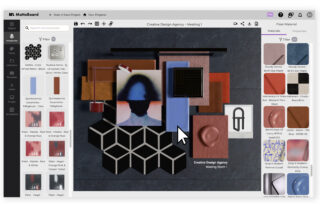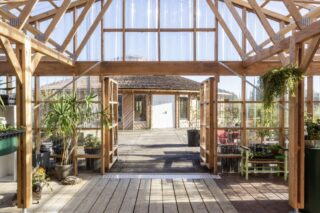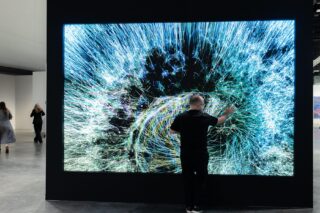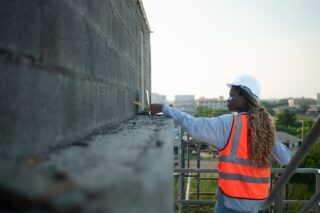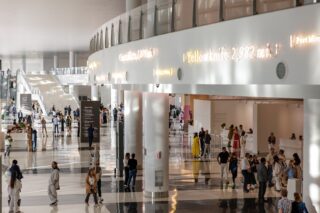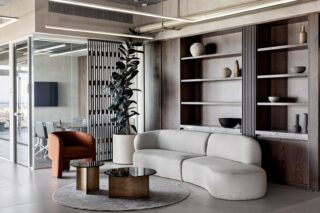This article was written by Beccy Dickson, Managing Director, Branded Bio, formerly Eco Foundry.
It’s no longer about ticking boxes with plush towels or offering a fancier cocktail menu than the next place. Guests are savvier, more conscious, and weary of empty promises. They want to walk into a space that feels like it’s been created for them, a space that genuinely supports their wellbeing, treads lightly on the planet, and gives them an experience they can’t get anywhere else.
The problem is, there’s a flood of “eco-friendly” claims out there, but so many venues are still stuck in old habits. You can feel it as soon as you walk in, a disconnect between what’s promised and what’s delivered. There’s a real hunger for authenticity, for spaces that don’t just look green but live and breathe it. It’s about moving beyond the surface and making wellbeing the heart of every design decision.
In my work, I see this shift every day. Clients and guests alike are asking tough questions, looking for evidence that a space isn’t just sustainable in name but in action. This is the crossroads: keep up with the old ways and risk being left behind, or step up and lead with substance, not just style. The only future that delivers—truly delivers—is the one where wellbeing comes first, for both people and planet.
The Real Issue: Wellbeing, Not Just Aesthetics
For years, hospitality design has been driven by aesthetics—what photographs well, what looks impressive on Instagram. But now, there’s a growing awareness that beauty alone isn’t enough. Sustainability has become the baseline expectation, not a nice-to-have. People want spaces that do more than just look good; they want places that help them feel good, breathe easier, and genuinely connect with nature.
According to the Global Wellness Institute’s 2023 report, the global wellness tourism market is expected to reach $1.4 trillion (about £1.1 trillion) by 2027, growing at more than 16% a year. That’s a staggering figure, and it’s driven by travellers who are prioritising health and wellbeing above traditional luxuries.
The World Green Building Council has shown that biophilic design – using living walls, integrated planters, and nature-inspired interiors – does more than please the eye. It reduces stress, improves air quality, and boosts guest satisfaction. International hotels are picking up on this: 1 Hotel Brooklyn Bridge in New York has 25,000 plants and reclaimed materials throughout its public spaces, while Parkroyal Collection Pickering in Singapore is a global benchmark for integrating living greenery into hospitality.
These aren’t just decorative flourishes. They’re commercial differentiators that drive repeat business and glowing reviews. At Branded Bio, I’ve seen it first-hand. Guests at our London Fashion Week: Unhidden installation described the living wall as transformative. The future belongs to those who deliver real substance, not just a pretty façade.
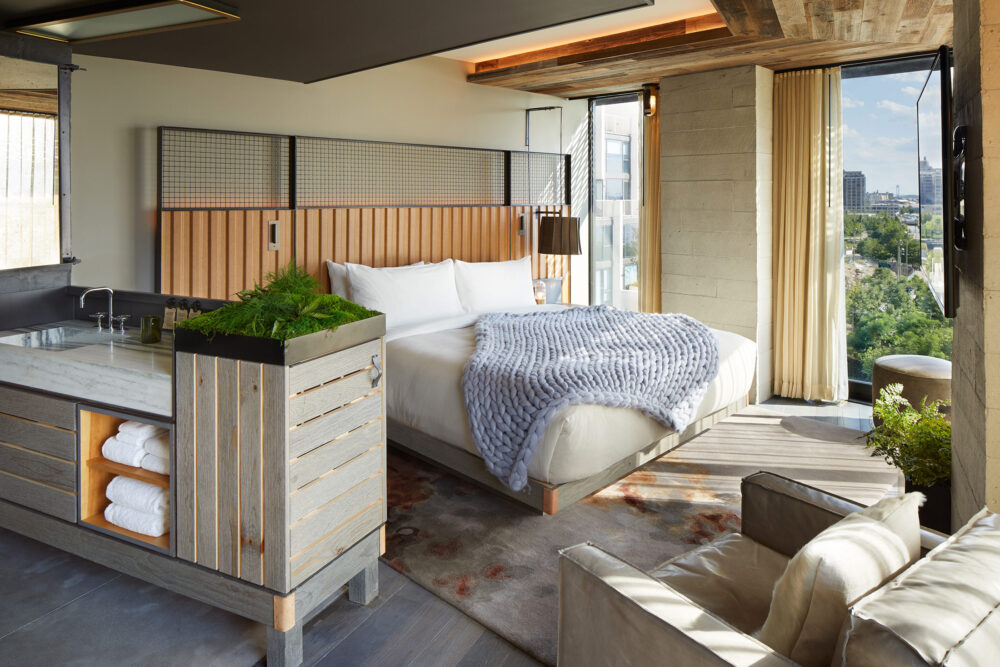
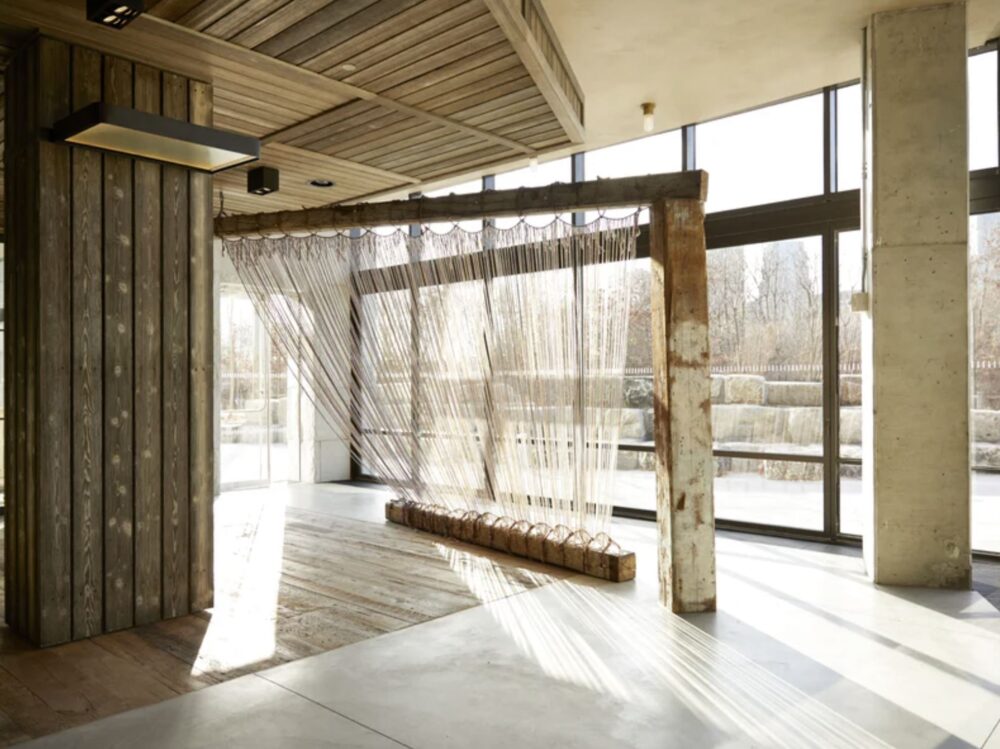
Tech That’s Changing the Game
Innovation in hospitality isn’t about chasing the latest gadget or trend. It’s about finding practical solutions that improve the guest experience and make operations more sustainable. Living walls and green infrastructure were once niche but now they’re fast becoming standard in hotels and event spaces all over the world.
Systems at Branded Bio are designed to be modular, easy to maintain, and fully reconfigurable, so spaces can adapt and stay fresh without waste. But it’s not just us. Globally, companies like Greenworks in Sweden and Naava in Finland are rolling out living wall systems in hotels, offices, and airports, improving air quality and boosting guest satisfaction.
Temporary installations can be just as impactful. Our Sustainable Discovery 2023 project showed how even a short-term green feature can set new standards for both beauty and sustainability.
Air quality is a huge focus. Marriott International has piloted air purification systems in several hotels, exploring new ways to improve guest wellbeing (Marriott International, 2020). Accor is investing in natural ventilation and air-purifying plants as part of their Planet 21 programme, aiming to create healthier environments across their portfolio.
Lighting is another area of growth. The WELL Building Standard, now adopted by Meliá Hotels International and others, encourages circadian lighting to support wellbeing. At Branded Bio, we design lighting schemes that work with our living walls, creating calming and restorative spaces, an example of which is a project we did for the Lloyds Bank Awards Ceremony.
Circular and upcycled fittings are also gaining ground. Smile Plastics in the UK and Mater in Denmark are leading the way with recycled surfaces, supporting the circular economy. Our own living furniture and event wall products are crafted from upcycled wood, green cast acrylic, and locally sourced materials, reducing embodied carbon and leaving a positive legacy.
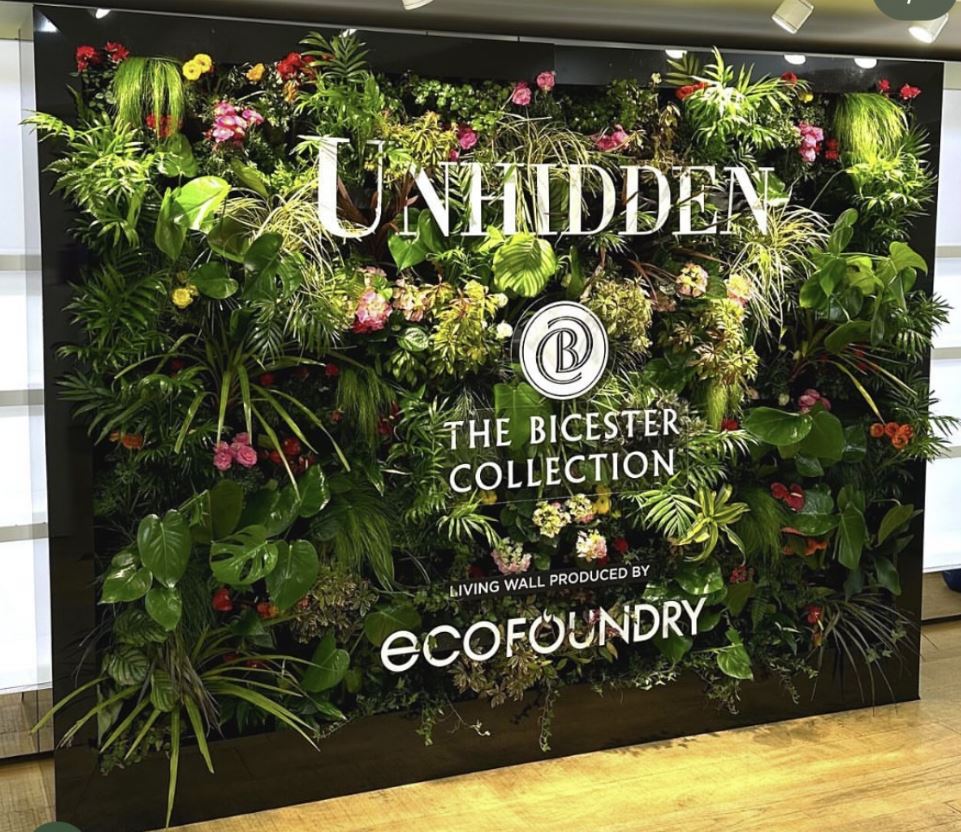
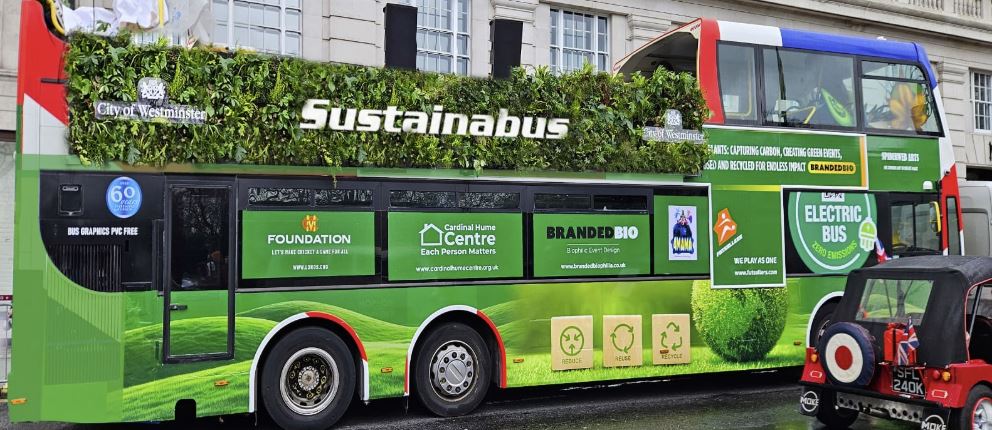
The Sustainabus debuted at the London New Year’s Day Parade, showcasing sustainable design in collaboration with Westminster Council.
The parade is a marvelous opportunity for London to celebrate by showing off the diversity, the creativity, and the inspiration that abound in this great city.
Portfolio Highlights and International Benchmarks
Branded Bio’s living wall installations have made their mark at events like Sustainable Discovery 2023, proving that even temporary hospitality spaces can be both beautiful and sustainable. Our work for London Fashion Week: Unhidden transformed a high-profile venue into a living showcase of biophilic design, while the Syntech Biofuel Opening Party demonstrated how living infrastructure can create immersive, eco-conscious atmospheres.
But this isn’t just a local trend. Internationally, the 1 Hotel group in the US has pioneered the use of reclaimed materials and living walls, setting a new standard for sustainable luxury. Oasia Hotel Downtown in Singapore is wrapped in a vertical garden that cools the building naturally and supports biodiversity, turning the building itself into a living ecosystem. Six Senses is another global leader, putting wellness, air purification, and biophilic features at the heart of its hotels.
These examples show that wellbeing-first design isn’t limited to one region or type of venue. From boutique hotels in London to luxury eco-resorts in Asia and North America, the industry is recognising that spaces which blur the line between indoors and outdoors, support mental and physical health, and demonstrate a genuine commitment to sustainability, are the ones that win guest loyalty.
In every project, my aim is to create sanctuaries that foster connection and calm, leaving guests feeling restored and inspired. That’s what keeps people coming back and talking about their experience long after they’ve checked out.
A Fresh Angle: Wellbeing-First, Powered by Tech and Circularity
What’s truly new in hospitality is the way wellbeing-first design, digital technology, and circular thinking are coming together. Leasing and reusing living infrastructure means that spaces can stay fresh, flexible, and sustainable, reinventing themselves for every season or event. This approach doesn’t just reduce waste- it makes the guest experience richer and more memorable.
Globally, operators are rethinking how they source and use materials. The Ellen MacArthur Foundation reports that circular economy initiatives could unlock £3.5 trillion in economic benefits by 2030. In hospitality, this means moving away from single-use décor and towards modular, reusable systems that can be updated and reimagined again and again. Brands like Interface are leading the way with carbon-negative flooring and upcycled materials, while companies such as Rensair are developing portable air purification units for hotels and public spaces.
Technology is making it easier to track and manage the lifecycle of materials, ensuring nothing goes to waste. At Branded Bio, every project is designed for disassembly and reuse, supporting both our clients’ ESG goals and the wider circular economy. The result is a hospitality experience that feels fresh, relevant, and responsible – one that guests remember and want to share.
This isn’t just about saving the planet; it’s about creating spaces that people genuinely love to spend time in, that make them feel good, and that leave a positive legacy for the future.
The Business Case for Biophilic Hospitality
The future of hospitality belongs to those who put wellbeing first, harnessing the latest technologies and sustainable practices to create truly memorable guest experiences. Happier, healthier guests stay longer, spend more, and return often. According to a 2024 Booking.com survey, 76% of travellers say sustainable practices influence their choice of accommodation, while the International WELL Building Institute has found that biophilic interiors can increase guest satisfaction scores by up to 20%.
In a world where “eco” is expected, it’s those who go further—the ones who surprise and delight and demonstrate a genuine commitment to both people and planet—who will lead the industry forward. The challenge now isn’t just to keep up, but to set the pace. For Branded Bio, that means honouring nature’s wisdom and resilience, creating spaces that deliver joy and connection and leaving no trace but a positive legacy. It’s about more than just design, it’s about making a real difference, for guests, for communities, and for the world we all share.
About the Author
Beccy Dickson is Managing Director of Branded Bio, a UK-based leader in sustainable, biophilic design for events and hospitality. With a focus on wellbeing-first spaces and circular economy principles, Beccy and her team help clients create immersive, authentic environments that delight guests and tread lightly on the planet.
Contact:
beccy@brandedbiophilia.co.uk
www.brandedbiophilia.co.ukFor more information or to discuss your next project, connect with Beccy via Calendly or LinkedIn.
